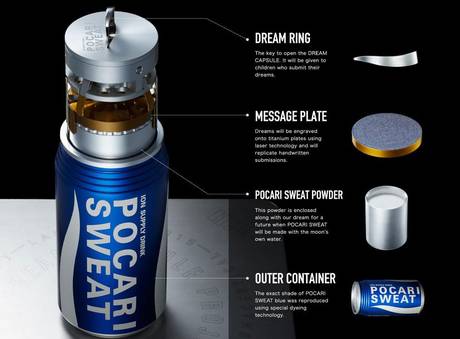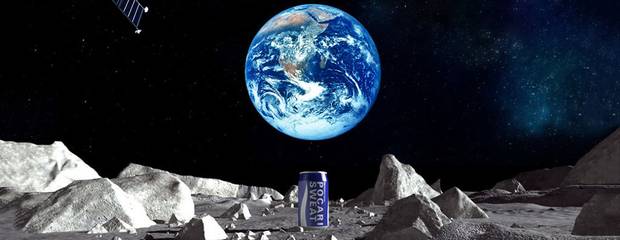

The Tokyo-based Otsuka Pharmaceutical (their drinks are sold for their health benefits, but they also develop their own drugs) says it wants to use private space companies to deliver a 1kg ‘Dream Capsule’ in the shape of a can of their most popular soft drink, Pocari Sweat, to the lunar surface.
As well as a small amount of Pocari Sweat in powdered form, the titanium can will also contain numerous disks with “messages by children from all over Asia” etched into their surfaces. “The time capsule contains the childrens’ dreams,” claims the company.
Children who submit their messages to the company will also be given a ‘dream ring’ – a special ring pull that opens up the can. Otsuka say that they hope this will inspire the young people to become astronauts and travel back to the Moon to one day re-read their dreams (and drink some tasty Pocari Sweat as well).
Despite the overt or even extreme commercialism of the project it also has a serious scientific goal, and in addition to delivering Pocari Sweat, Otsuka will be hoping to place the first privately-launched lander on the Moon.
The company will be working with a Pittsburgh-based firm named Astrobotic Technology to send their capsule on the 236,121 mile trip to the Earth’s satellite, with the mission planned to take place in October 2015. Astrobotic will use a Falcon 9 rocket to make the trip – the hopefully-reusable launcher under development by Elon Musk’s private space company, SpaceX.
If Astrobotic and Otsuka manage to complete the mission they’ll also be able to claim the multi-million dollar bounty offered by Google’s Lunar X competition. The search giant announced the prize back in 2007 as a spur for private space companies, offering $20 million to the first team to “land a robot on the surface of the Moon, travel 500 meters over the lunar surface, and send images and data back to the Earth.”
Astrobotic’s involvement in the project is particularly ironic as the company, which reportedly charges upwards of half a million dollars to send items to the Moon, is mainly interested in developing technologies designed to clean up debris in space – instead they’ll be dumping what some will view as trash on the lunar surface.
Although Otsuka’s ambitions sound like the extreme end of the PR stunt spectrum (althoughm how does it compare to projecting a loaf of bread onto a beloved public sculpture?) space advertising has a storied – if controversial – history.
In 1993, an American company named Space Marketing Inc proposed launching a 1 kilometre squared illuminated billboard into low orbit, which would have appeared as big and as bright as the Moon in the night’s sky. Public outcry scuppered the plans and the US government subsequently introduced a ban on advertising in space.
However, the legislation was later amended to allow “unobtrusive” sponsorships, a change that meant Pizza Hut was ablle to pull off an advertising coup in 2001 by delivering a vacuum-sealed pizza (it was salami flavour – pepperoni didn’t have the necessary shelf life) to astronauts aboard the International Space Station (ISS).
Otsuka and Pocari Sweat have also tried this sort of stunt before, and in the same year as Pizza Hut made the ultimate home delivery, the Japanese company created the first high-definition commercial in space, filming two Russian cosmonauts drinking Pocari Sweat and gazing pensively out of the window at the surface of the Earth below. In this context, delivering a can to the Moon’s surface seems like a small step for advertising, rather than a giant leap.
